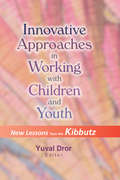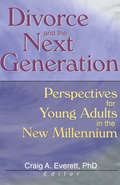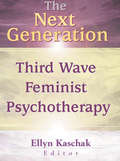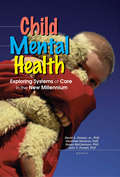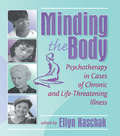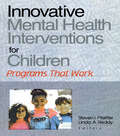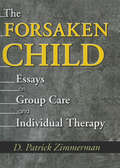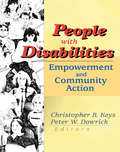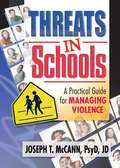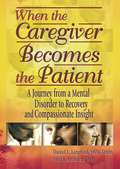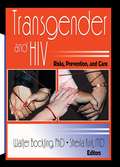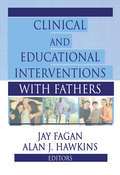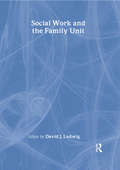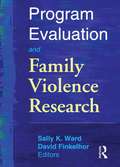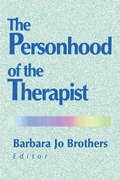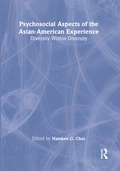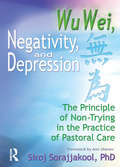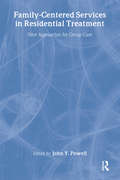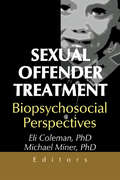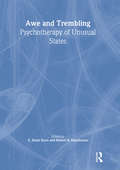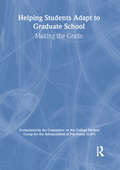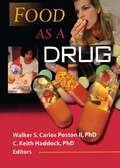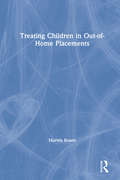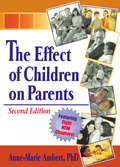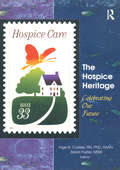- Table View
- List View
Innovative Approaches in Working with Children and Youth: New Lessons from the Kibbutz
by Yuval DrorExplore the unique social and educational laboratory known as the Israeli kibbutz!This valuable book examines state-of-the-art innovations in services for children and youth happening today in the kibbutz in Israel. It brings to light the latest developments in integrated services for clients inside and outside the kibbutz society, services for detached and troubled individuals and groups from outside the kibbutz, and regional services that include kibbutz and non-kibbutz children who live at home while attending kibbutz institutions.According to editor Yuval Dror, ”Since the mid-1980s, the kibbutz movement has experienced a deep social and economic crisis, but despite this negative influence on the semi-private kibbutz educational system, the uniqueness of &’communal/cooperative education&’ has been maintained, and has even grown. The openness of the kibbutz to its neighbors from non-kibbutz settlements in the 1980s and 1990s enabled rural areas to succeed in fruitful cooperation with the kibbutz. These experiences are detailed here.”In Innovative Approaches In Working with Children and Youth: New Lessons from the Kibbutz you&’ll learn about youth aliya groups (youth societies), the Project for the Education of Israeli Children in the Kibbutz Movement, the NA&’ALEH Program, and the Zweig Center for Special Education at Oranim. This unique book brings you: a comparison of two kibbutz secondary boarding schools with residential facilities in different forms a look at a unique way of absorbing young Russian immigrants in kibbutzim and other residential settings an examination of integration practice in kibbutz day schools a discussion of how Kfar Tikva serves disabled adults . . . and much more!Educators and their students, youth workers, and social workers, as well as anyone with an interest in the unique learning opportunities offered by the kibbutz system will find Innovative Approaches In Working with Children and Youth: New Lessons from the Kibbutz an invaluable tool.
Divorce and the Next Generation: Perspectives for Young Adults in the New Millennium
by Craig EverettCan the children of broken homes learn to trust promises of commitment?The repercussions of divorce on children has been hotly debated for years. Divorce and the Next Generation: Perspectives for Young Adults in the New Millennium offers solid, peer-reviewed research into the aftermath of divorce. This valuable volume presents a scientific look at an issue that all too often is discussed in ideological terms. This sequel to the groundbreaking Divorce and the Next Generation (published in 1993) examines the emotional, relational, and even physiological effects of divorce. It offers helpful tables and figures, thorough literature reviews, and metanalysis as well as original research. The studies analyze such diverse factors as gender, age at divorce, and level of conflict in the marriage. The results may surprise you.This book takes a close look at the psychological interactions of divorce with many areas of children’s emotional functioning, including: relationship with parents interpersonal relationships attitudes toward intimacy and marriage self-blame and self-esteem gender schematizationDivorce and the Next Generation, brings together some of the leading researchers in the field. These detailed studies in the lingering aftereffects of divorce will be of interest to psychologists, family therapists, and policymakers.
The Next Generation: Third Wave Feminist Psychotherapy
by Ellyn KaschakShape a better future with the insights of the third wave!Is feminism still necessary? How can older feminists and younger ones find a common ground to discuss issues that affect them both? What does it mean to be a third-wave feminist? The Next Generation explores these and other issues that deeply concern feminist therapists of all ages.This powerful book examines the psychological and cultural context of the third wave of feminism. The young feminists whose voices are heard in The Next Generation grew up in a very different world than the feminists who came of age in the 1960s and 1970s. Dialogues between older and younger feminists explore conflicting cultural images of the feminist establishment as successful freedom fighters or angry, anti-sex activists. The Next Generation discusses the issues young feminists face, including: the false sense that feminism is no longer necessary the social and historic context of young women's lives finding and sharing power in the therapeutic relationship building healthy mentoring relationships creating psychotherapy partnerships with adolescent girls The Next Generation offers a fruitful dialogue between older women who remember the bitter battles for the ERA and younger feminists who take for granted women's presence on the Supreme Court. Each generation builds on the foundations of the past, and the feminist psychotherapists represented in this volume offer fresh insights and techniques appropriate for the way we live now. The Next Generation is an essential resource for therapists and feminists of any age.
Child Mental Health: Exploring Systems of Care in the New Millennium
by John Y Powell David Dosser Dorothea Handron Susan Mccammon Sandra A. SpencerUse these system-of-care concepts to better serve children with serious emotional problems and their families!Providing services to children with emotional problems and their families continues to be a major challenge for social workers, family therapists, child mental health advocates, and psychologists in the new century. This valuable book addresses that challenge, detailing theory, principles, and application issues from the vantage points of both consumers and service providers. System-of-care values and practices were developed to address these concerns and meet the needs of these children and families, who tend to receive either no services at all or services that are far too restrictive, at a large cost to the organization providing the services.Child Mental Health: Exploring Systems of Care in the New Millennium identifies salient issues and offers suggestions for addressing the complexities of providing services for these troubled families. It also provides hope and encouragement for family members and professionals by identifying roles and practices that are effective in building collaborative community-based services.This book takes an incisive look at: the benefits and difficulties of partnering between practitioners and families the need for and benefits of partnering between practitioners of various disciplines within the system of care a working model of a wraparound process (the hallmark of the system of care) barriers that prevent effective wraparound services and what causes them the need to help social workers learn parent partnering skills the roles that families can play in the system of care the need for specialized training so that practitioners can learn to assess, understand, and integrate a family's spiritual beliefs into the system of care the development of an interdisciplinary, collaborative practice course at East Carolina University experiential training and shared-classroom experiences for studentsChild Mental Health: Exploring Systems of Care in the New Millennium is a tool that will aid practitioners and consumers alike as they shift their point of view from the provider-as-expert paradigm to one of building partnerships.
Minding the Body: Psychotherapy in Cases of Chronic and Life-Threatening Illness
by Ellyn KaschakSupport and empower women who are coping with the pain, fear, and stigma of serious diseaseBeing diagnosed with cancer, chronic fatigue syndrome, or fibromyalgia is a traumatic event that takes place at a time when the patient is already feeling physically (and often emotionally) drained. Minding the Body combines feminist and social constructionist approaches to offer an intimate look into the ways a therapist can help clients cope with the pain, fear, and stigma of serious disease.Minding the Body offers an alternative to the reductive view of the mind-body connection and also examines the potential for growth that such experiences often allow. The essays gathered here show how an effective therapist can help the client deal with the painful and difficult emotions that exacerbate illness, while learning the emotional and spiritual lessons illness can teach. Minding the Body presents both theoretical views and personal accounts of illness, including: scholarly discussions of the issues involved in autoimmune disorders a therapist's personal experience of chronic fatigue syndrome a personal and professional exposition of a woman's struggles with injury, illness, and managed care, co-written by client and therapist suggestions for understanding the social construction of illness and treating disease from a social-constructivist point of view narratives reflecting on the change and growth of therapists diagnosed with cancer and other serious illnessesBy looking at illness in the context of mind, body, society, and medical establishment, Minding the Body will help therapists, doctors, nurses, counselors, and clients deal with the grief, disappointment, and frustration of chronic and life-threatening illness.
Innovative Mental Health Interventions for Children: Programs That Work
by Steven I Pfeiffer Linda A ReddyChildren and families are in increasing need of mental health services that are more effective and less costly. Are you prepared to make this happen?This vital book for clinical psychiatrists and trainers examines uniquely successful prevention programs addressing the most challenging mental health problems in children. In it, leading authorities in child and family mental health provide compelling descriptions of these model prevention programs, which are clinically proven and cost-effective.Each chapter describes an internationally recognized program, including program mission and goals, key treatment ingredients, logistical and operational considerations, evaluation data, and replicability/transportability considerations. With Programs That Work: Innovative Mental Health Interventions for Children, you will explore insightful, expert examinations of: an interpersonal cognitive problem-solving program that can reduce and help prevent high-risk behaviors in young children a video-based program aimed at reducing substance abuse and behavioral problems in young adolescents the Teaching-Family Model (TFM) which stresses the importance of a positive family environment for children and adolescents with emotional/behavioral problems in residential treatment centers a set of school-based intervention programs for parents, teachers, and children ages 3--10 which can help reduce or prevent conduct problems and drug abuse in children MST (multisystemic therapy) programs aimed at juvenile offenders and youths who abuse substances--people who are not typically compliant with treatment programs the Anger Coping Program which can improve the social/cognitive skills of aggressive children aggression replacement training which combines skill streaming, anger control, and moral education to prevent aggression in adolescents multidimensional treatment foster care for adjudicated youthThe programs and interventions you will find in Programs That Work: Innovative Mental Health Interventions for Children address a great variety of serious emotional problems in children and adolescents, and emphasize the importance of an ecological and multi-systems approach to treatment. Explore them and choose what will work best for the children and families in your community!
The Forsaken Child: Essays on Group Care and Individual Therapy
by D Patrick ZimmermanResidential treatment can be a path to healing or a revolving door. Make the program you're involved with as effective as possible!For a number of years, many mental health professionals, public interest groups, and child advocates have been pressing for the use of increasingly time-limited (short-term) models of residential treatment and psychotherapy for children and adolescents. Yet the children who are most often referred for residential care are clearly more emotionally disturbed than in years past. They have more extensive backgrounds of social failure and often have dysfunctional or barely existent families. The Forsaken Child confronts this dilemma. These essays on the delivery of group care and individual treatment services for young people present an argument for the preservation of thoughtful, humanistic forms of residential treatment. In The Forsaken Child: Essays on Group Care and Individual Therapy, you'll find well-thought-out discussions of: Anna Freud's altruistic devotion to providing group care for the infant and child victims of World War I bombings in London, with descriptions of important parallels between her observations of the young war victims in her care and the experiences of abandoned, neglected, and abused children in American cities today the historical foundations of milieu treatment and an examination of persisting issues the humane concerns of the early founders of residential care vs. the present-day objectivist climate a long-term case study of a young child in residential care highlighting a number of clinical issues which contraindicate the use of either brief therapy techniques or short-term group care how an interactive, social-constructionist treatment approach helped an adolescent boy in residential care achieve psychological growth and a sense of optimism about the futureThe Forsaken Child will be of significant help to residential facility administrators in longer-range program planning and to social workers and other clinicians who cope with the daily clinical issues that arise in group and individual treatment settings.
People with Disabilities: Empowerment and Community Action
by Peter W. Dowrick Christopher B. KeysDevelop more effective community initiatives and build solid collaborations!Although the fields of disability studies and community psychology developed separately, with little crossover, they have evolved similar values, principles, and tactics. People with Disabilities: Empowerment and Community Action is the first volume to bring together these two fields. Now disability activists and community psychologists can join forces, share ideas, and gain strength from one another.This landmark volume offers empirical research and practical advice from respected scholars in the field. People with Disabilities: Empowerment and Community Action presents tested strategies for empowering a wide variety of people with disabilities, including Latinos, the aged, the developmentally disabled, low-income schoolchildren, and patients with chronic diseases. The diversity of strategies offered here means that every community can find a way to make its own voice heard.People with Disabilities: Empowerment and Community Action offers detailed, step-by-step plans for developing a broad range of programs, including: choosing strategies to suit rural, suburban, and urban environments taking a capacity-building approach to community empowerment developing participatory action plans building effective coalitions enabling collaboration between inner-city universities and the community With its solid research, helpful tables and figures, and well-organized action plans, this book is certain to become a classic in the fields of disability studies and community psychology.
Threats in Schools: A Practical Guide for Managing Violence
by Joseph T MccannManage potentially violent situations in your school with these expert techniques!In the wake of several highly publicized school shootings, the problem of school violence has increasingly become a focus of concern for the general public as well as teachers, school officials, and students. Drawing on case studies from publicized violent incidents as well as from Dr. McCann's private practice, Threats in Schools: A Practical Guide for Managing Violence provides techniques for identifying, conceptualizing, assessing, and managing threatening behavior by students in school settings. Offering specific case management strategies for a variety of situations, this indispensable volume provides guidance on formulating questions to ask and suggestions for developing strategies for managing potentially violent situations.Integrating threat assessment and risk management models, this approach will help you target potential threats to property, other students, teachers, and school staff. The interdisciplinary approach recognizes that violent behavior is dependent on the characteristics of the perpetrator, victim, and setting, and that the relationship between threats and violence is not always clear. Threats in Schools offers well-grounded research, detailed case studies, and theoretical approaches to help you deal with the tough issues, including: zero-tolerance policies and their more effective alternatives why profiling techniques to identify violence-prone students are of limited use interventions to defuse potentially violent situations critical incident stress managementFive appendixes offer forms and checklists to help you plan and evaluate, including: threat assessment and management planning checklist of characteristics of perpetrators of school violence questions for evaluating general risk of violence fire-setting and bombing risk assessment sex offense risk assessmentLucidly written and illustrated with helpful tables and figures, Threats in Schools offers school officials, mental health professionals, community leaders, and the media the information they need to understand what sparks school violence and which approaches reduce the risk of it.
When the Caregiver Becomes the Patient: A Journey from a Mental Disorder to Recovery and Compassionate Insight
by Harold G Koenig Emil J Authelet Daniel L LangfordExamine a compelling account of a professional caregiver’s inspirational struggle with a mind/body illness and the renewed sense of compassion his recovery provides.This uplifting narrative is the story of a caregiving professional stricken by panic attacks, a wounded healer desperate to be healed. When the Caregiver Becomes the Patient is the candid and compassionate first-hand account of Daniel Langford’s struggle with the anxiety disorder that signals a physical, cognitive, and emotional crisis that paralyzes him, despite his extensive background as a health care professional, social worker, and pastoral minister. His journey from the disorder’s horrifying onset to the understanding and acceptance of its roots, and finally, to an insight that evokes a renewed appreciation for the human spirit is an inspirational guide to healing and recovery.The anecdotal form of When the Caregiver Becomes the Patient lends itself to a personal retelling of Langford’s struggle, detailing his sessions with family physician Dr. David Betat, and colleague and co-author Dr. Emil Authelet as they explore the biopsychosocial and spiritual dimension of Langford’s attacks. Their informal dialogues serve as a model of how a lateral relationship between colleagues can create an environment for healing and recovery that can be passed on to others. The book also critiques and reviews existing literature on panic attacks and anxiety disorders related to the author’s search for understanding.When the Caregiver Becomes the Patient examines: panic attacks--cause, treatment, and recovery a critique of existing literature on panic attacks clinical and spiritual perspectives on anxiety disorders critical elements of the healing process effects on the caregiver’s relationship with his/her client a fresh model for the caregiver/patient relationshipAn essential resource for caregivers, counselors and therapists, educators, physicians, and health care and religious professionals, as well as those searching for an understanding of anxiety disorders, When the Caregiver Becomes the Patient reassures those who receive care that the care giver struggles with life as well. That understanding of the mutuality of pain and recovery creates a connection that helps ease the isolation that often accompanies suffering.
Transgender and HIV: Risks, Prevention, and Care
by Edmond J Coleman Sheila Kirk Walter O BocktingDeliver effective services to this growing population! This volume presents the first collection of reports on the impact of HIV/AIDS on the transgender community worldwide. It includes a thorough description of the unique HIV risks of transgender people and exposes their largely neglected health and social service needs. This unique book also reports on the first generation of prevention interventions targeting this community, discusses guidelines for providing sex reassignment services to HIV-positive transsexuals, and encourages collaboration between communities at risk, researchers, and people in the helping professions.The social stigma faced by this population adds to their risk of HIV infection. Low self-esteem, rejection, neglect, employment discrimination, disenfranchisement, and a desire for acceptance and validation are all contributing factors. Yet, as the editors point out, “On the positive side, the transgender community has been able to mobilize and empower itself, and has found a voice that no longer can be ignored. We call on transgender and nontransgender people alike to work together to advance HIV prevention and promote our sexual health.”In Transgender and HIV you'll encounter: extensive discussions of the health, social service, and HIV prevention needs of the transgender community tips on how to work with marginalized communities in an empowering way explorations of the sexuality of both male-to-female and female-to-male transsexuals first-ever findings on sex reassignment surgery on HIV-positive individuals guidelines for surgery on HIV-positive transsexualsTransgender and HIV provides much-needed and often-requested information on HIV prevalence, risks, prevention, and care for this increasingly visible community.
Clinical and Educational Interventions with Fathers
by Jay Fagan Alan HawkinsCall on men's hidden strengths to help them become responsible fathers in even the most challenging circumstances!Clinical and Educational Interventions with Fathers gives you fresh approaches for effective interventions with fathers. Whether by calling on their faith to help them deal with the complexities of fatherhood or offering high-tech interventions on the Internet, these techniques help men find their strengths, maintain their masculinity, and learn to guide, nurture, and discipline with love and responsibility. Instead of thinking of fathers as deficient, the book emphasizes finding fathers’strengths and potentials for growth. It also respects the diversity of parenting styles among fathers from various ethnic, racial, and class backgrounds.No man wants to be a bad father. Nevertheless, many men in our culture do not know how to care for the children they beget. Trapped by stereotypes of masculine behavior and deprived of positive role models, they find themselves trying to do the challenging work of fatherhood without the necessary resources, information, or support.Clinical and Educational Interventions with Fathers offers positive approaches to helping men become responsible fathers, including: designing special techniques and programs to help fathers in prison and other challenging circumstances helping fathers manage anger developing therapeutic support groups for African-American men offering Web-based support for fathers training staff to recognize and respond to fathers’unique needs finding legal tools to support fathers’rightsReaching fathers has become an ever more urgent priority for practitioners as family structure and family life change. Traditional social-service programs for mothers tend not to work well with men's very different needs and attitudes. Yet very little has been published on successful interventions with fathers. Clinical and Educational Interventions with Fathers fills that gap and suggests promising new directions for further research in this field. By offering positive, tested ways to help men become responsible fathers, this volume will help you improve their lives and the lives of their sons and daughters.
Social Work and the Family Unit
by David J. LudwigUse the techniques in this book to conduct productive, successful sessions with your clients!Social Work and the Family Unit offers methods and suggestions for focusing on problems within relationships, rather than simply placing blame, in order to dispel stressful and unhealthy situations. This essential book will show you how to empower couples to understand the relationships that form the fabric of their lives, the benefits ”we” thinking, and how spirituality influences people's connections and experiences. Social Work and the Family Unit provides therapists and clients with techniques and examples for conducting more successful and productive sessions.The authors of the six sections of Social Work and the Family Unit draw on their expertise to address the overwhelming importance of focusing on relationships when working with individuals and families. Editor David Ludwig's ”It's the Relationship, Stupid!” gives specific case descriptions showing that, in most situations, the client is focusing on the wrong thing as the cause of his or her distress. Alex Opper's ”What Do You Mean, 'It's the Relationship'? What's That Got to Do with Step-Parenting” points to the difficulty of, and suggests ways of, forming a good ”we” from the ”us” versus ”them” tensions often found in blended families. Walter Murphy's ”Growing up in a 'We’Family” and William B. Knippa's ”The Family Unit: Place, Base, or Both?” focus on the benefit to children of a united parental front that they cannot manipulate.Donald R. Bardill's ”The Relational Systems Model: Reality and Self-Differentiation” identifies the relationships that form the realities (self, other, context, and spiritual) of each person's life and shows how clients can be empowered to live in each of these four realities as self-differentiated persons.The final chapter, by Joanides, Joanning, and Keoughan, provides you with a systematic description of religious people's perceptions of religion and spirituality. It shows that important contextual information can be missed when therapists and researchers fail to address religion and spirituality from the perspectives of clients who are guided by faith. Implications for MFTs and MFT researchers are discussed in detail.The information you'll find in Social Work and the Family Unit will help you and your clients to understand what's really going on in their families and their lives. This valuable book belongs in your professional collection!
Program Evaluation and Family Violence Research
by Sally K. Ward David FinkelhorUnderstand and evaluate family violence programs for your community!Twenty years ago, the major issue in creating interventions to prevent domestic violence was persuading the courts, the funding agencies, and society that domestic violence was a serious problem worthy of time, trouble, and money. Now that the importance of domestic violence has been established, we need safe and effective ways to evaluate those interventions to see which ones are working and how they can be improved. Program Evaluation and Family Violence Research brings together some of the best minds in the field discussing such vital evaluation issues as policy implications, alternative designs for evaluation studies, and ethical concerns.This comprehensive book approaches the vexed question of evaluation with compassion as well as scientific rigor. Clearly, traditional double-blind studies and control groups are difficult to conduct when family violence is the subject; it is ethically indefensible to sit back and watch abusers hurt their mates or children when interventions are available. Yet finding usable methods of program evaluation is also essential. Program Evaluation and Family Violence Research confronts these questions and discusses practical ways to evaluate a variety of domestic violence programs.Program Evaluation and Family Violence Research draws on years of experience to address the difficult questions raised, including: going beyond evaluating program effectiveness to analyze why and how interventions help change behavior creating new research designs to adapt to the unique concerns of the family violence field using meta-analysis for program evaluation research determining the interaction between research and program results identifying barriers between community activists and social scientists that may impede researchProgram Evaluation and Family Violence Research offers fresh and creative ways to do program evaluations, guarantee subjects’physical and emotional safety, and make good science humane.
The Personhood of the Therapist
by Barbara Jo BrothersYou don't have to check your humanity at the office door!Drawing on the teachings of Virginia Satir, this humane volume is designed to help therapists bring their full selves into the therapeutic relationship. The Personhood of the Therapist examines what happens when a therapist consciously enters the process of healing in an I-Thou relationship with the client. The techniques outlined in this volume will help you develop a greater sense of openness about yourself and your feelings, enabling you to offer clients more effective services.The Personhood of the Therapist explores the myriad ways in which a therapist's emotional responses and life experiences can contribute to the client's healing. This approach is a dramatic departure from the traditional Freudian ideal of the aloof, unresponsive analyst, but the case studies in this volume will persuade you that it is powerfully effective. In addition to case studies, this thoughtful, compassionate book offers dialogues, personal reminiscences, techniques, and discussions of psychological theory. The Personhood of the Therapist offers new ideas and fresh perspectives on such life-changing issues as: self-disclosure and self-awareness for therapists ways to respect and foster the full sacredness of the client the different roles of the therapist important new views on transference and countertransferenceIt also contains deeply moving accounts of individual experiences, including: how an oncotherapist was affected by her own family's experience with cancer using Integrity Therapy to heal old wounds for a troubled couple, along with the comments of the two clients a therapist's own emotional journey through a troubled marriage and the strange disappearance of her sister The Personhood of the Therapist will help you employ your knowledge about life, not just theories, to offer better services to clients and help you appreciate how clients can enrich your life.
Psychosocial Aspects of the Asian-American Experience: Diversity Within Diversity
by Namkee G ChoiDiscover intervention strategies for issues affecting Asian Americans!This important book examines the childhood, adolescence, young adulthood, and aging stages of Asian Americans to help researchers and practitioners offer better services to this ethnic group. Psychosocial Aspects of the Asian-American Experience will help you understand the ethnic and cultural diversity within the Asian-American population and offers both quantitative and qualitative research that may impact social policies and social services for Asian Americans.Representing Chinese, Japanese, Filipinos, Koreans, Asian Indians, Vietnamese, Hmong, Cambodians, and native-born Hawaiians, this helpful book covers a wide span of individual ethnic identities in order to represent the scope of the Asian-American subculture.The topics and problems examined in Psychosocial Aspects of the Asian-American Experience include: ethnic identity, acculturation, and cultural orientation psychological adjustment of adoptees attitudes and behavior of adolescents regarding academic achievement social network composition depression and other mental health problems dating violence and domestic abuse substance abuse aging In addition to analyzing these problems, this book also presents culturally competent intervention strategies to assist human services practitioners in offering their clients relevant services that are appropriate for their ethnic backgrounds, beliefs, and experiences. This book is also a valuable resource for researchers, policymakers, and graduate students and faculty members in the areas of social work, sociology, psychology, and ethnic studies.
Wu Wei, Negativity, and Depression: The Principle of Non-Trying in the Practice of Pastoral Care
by Siroj SorajjakoolDiscover a pastoral approach to depression that combines Eastern wisdom and Western science!Wu Wei, Negativity, and Depression reveals a way to break the cycle of depression, not by denying it or fighting it, but by the ancient principle of wu wei, non-trying. The bleak cycle of depression starts when people experience negativity. They turn inward to try to find self-esteem, but the negativity strips all the power of self-affirmation from them. The gap between is and ought--how they see themselves and how they want to be--is too great to bridge. The cycle known as self-regulatory perseveration means that depressed persons are caught in a desperate, fruitless search for affirmation. Instead of self-esteem, they find self-criticism and further negative thoughts. Yet they keep looking . . . and looking . . . and looking. The more they look for self-worth inside, the less they find, and the harder they try--the cycle continues. When trying simply doesn&’t work, wu wei, the principle of letting go, may help break that cycle. When trying simply doesn't work, wu wei, not-trying, may help. Wu wei is the principle of letting go. By giving up on the self-imposed and unattainable oughts and shoulds, the depressed person stops focusing on self. Wu wei breaks the cycle of negativity, allowing the depressed person to begin to heal.Wu Wei, Negativity, and Depression offers a comprehensive discussion of depression, including: epidemiology of depression etiology and biological causes psychosocial theories standard treatments of the past and present pastoral care of depressed persons This important book constructs a possible approach to depressed souls weary of fighting and trying to fix themselves. Wu Wei, Negativity, and Depression can bring new hope to those who most need it.
Family-Centered Services in Residential Treatment: New Approaches for Group Care
by John Y PowellAdopt a more effective approach to temporary and long-term residential care! Presenting the voices of staff, parents, and residents, Family-Centered Services in Residential Treatment: New Approaches for Group Care examines the changes and challenges of residential care from the old-fashioned orphanage to the modern group-care home. These thoughtful essays offer suggestions and methods to provide more effective services in temporary and long-term settings. Containing case studies, personal experiences, and professional insights about the potentials and limitations of residential care, this reliable resource will help you develop improved services for youths and their families. Family-Centered Services in Residential Treatment presents fresh evaluations of new and old techniques as well as ideas for meeting individual needs. By building connections among parents, youths, and staff, you can develop more successful treatment programs and encourage stronger family ties even when children are best served by long-term residential care.Family-Centered Services in Residential Treatment addresses the crucial questions of residential care, including:how can staff ease children's transitions into and out of residential care? what do parents of emotionally disturbed youth need from the staff and professionals in a residential care setting? what was right--and wrong--about the old-fashioned orphanage? Could such an institution work today? how does the transition to the teamwork approach affect staff members? when is residential care most beneficial to children? what kind of care is appropriate for AIDS orphans?Family-Centered Services in Residential Treatment will help psychologists, therapists, and social workers unite theory and practice to create a family-oriented environment for troubled clients.
Sexual Offender Treatment: Biopsychosocial Perspectives
by Edmond J Coleman Michael MinerGain a better understanding of the biological, psychological, and social aspects of sex offenders, their crimes, and the treatments that can help them The treatment of sexual offenders varies from culture to culture and nation to nation. Sexual Offender Treatment: Biopsychosocial Perspectives assists sex therapists, counselors, psychiatrists, and psychologists working in sex offender treatment around the world in providing more effective services. This book looks at the behavior of sexual offenders and offers treatment approaches that will stimulate your thinking and help you improve your research and treatment methodologies. This valuable and informative book introduces and discusses the formation of the new International Association for the Treatment of Sexual Offenders, which will advance the existing knowledge about the nature of sexual offenders and sexual offenses, work to improve treatment methods and disseminate information about improved methods, and scientifically evaluate therapeutic methods advocate for the right of sex offenders to effective treatment.Sexual Offender Treatment: Biopsychosocial Perspectives presents an overview of recent research in the treatment of sexual offenders as presented at the 5th International Conference on the Treatment of Sexual Offenders in 1998 in Caracas, Venezuela. This book explores: the recently revised Standards of Care for the Treatment of Sexual Offenders self-perceived aggression in relation to brain abnormalities in a sample of incarcerated sexual offenders self-concepts and interpersonal perceptions of sexual offenders in relation to brain abnormalities brain abnormalities and violent behavior group family interventions for the treatment of adult male child molesters the experiences of adult and adolescent female sex offenders a 7 step system to treat pedophiles who are mentally retarded, mentally ill or physically handicappedSexual Offender Treatment: Biopsychosocial Perspectives provides you with valuable insights and a cross-cultural viewpoint as you benefit from the expertise and experience of international scholars who have set the standards for the treatment of sex offenders.
Awe and Trembling: Psychotherapy of Unusual States
by E Mark Stern Robert B MarchesaniGain new insight into panic and anxiety-related disorders!Awe and Trembling: Psychotherapy of Unusual States provides psychologists, psychotherapists, and clinical social workers with an overview of the symptoms and causes of panic. The book gives insight into how patients cope with anxiety to help you provide more sympathetic services to your clients. You will discover how to deal with panic in an integrative way rather than relying on medication or cognitively coping by rationalization. You will also discover current methods that will improve the lives of suicidal patients, such as talking the patient through the suicidal act and inspiring thought about what would happen and discussing what the patient intends for those that are left behind. Awe and Trembling offers effective techniques that will help you give better care to clients suffering from these difficult disorders.Compelling and informative, Awe and Trembling will help you recognize when panic in your patients is a breakthrough rather than an impending breakdown or collapse. You'll be able to help your patients find new possibilities for a better life, instead of living with the chaos that comes with anxiety.In Awe and Trembling, you'll find ideas that will help you assist your patients in overcoming anxiety and panic, such as: discovering ways to treat each patient as a living, breathing individual with his or her own personality and treatment needs examining the therapy session as a vehicle for meditative awakening and deeper self-understanding for your patients realizing that if you replace the isolation of panic with structure and connection using such techniques as breathing exercises or yoga, panic attacks can be controlled acknowledging that suffering has potentially liberating as well as debilitating dimensions discovering an integrated clinical model of understanding that addresses panic and anxiety from an existential perspective understanding that anxiety and panic often serve as opportunities for clients to examine the conflicts in their lives and within themselves to create a deeper, more authentic existenceAwe and Trembling will show you new ways to help your clients on their journey toward wholeness and a more comfortable, rewarding life. This valuable book will provide you with a unique perspective on panic and awe to help your clients overcome their anxieties and heal themselves and their lives so they can regain their emotional and physical independence.
Helping Students Adapt to Graduate School: Making the Grade
by Chairperson Robert L. Arnstein, Md Varda Backus, Md, Chairperson Robert L. Arnste SilberHelp graduate students cope with the pressures of school, finances, family, and professors! In order to succeed in school: The college undergraduate just has to be able to find and operate an elevator in the campus high-rise The master's degree student has to climb the side of the building The PhD student doing research with a professor has to jump over the building in a single bound, carrying the professor That bit of grim humor contains a bitter kernel of truth. Helping Students Adapt to Graduate School is the first book that focuses on the unique problems of graduate students and the best ways to counsel and support them. Graduate and professional schools are draining - emotionally, financially, and physically. In addition to coping with the pressures of classes and high performance expectations, many graduate students juggle multiple lives, trying to please their professors, maintain their status as adults, pay for books and classes and rent and food, keep up a place to live, preserve their marriages, raise their children, and deal with their parents, all while they work as teaching assistants, resident advisors, or research assistants. When adults return to school, they may find themselves forced into a childlike status, causing considerable resentment or regression and sometimes reawakening old conflicts. Furthermore, the relationship of professors and graduate students is often complex and emotionally enmeshed, tinged with issues of respect, rivalry, and even romance. Not surprisingly, many graduate students find the conflicts overwhelming at times. With fascinating case studies and lucid explanations, Helping Students Adapt to Graduate School offers a clear look at the special difficulties of graduate students and practical ways the university can help, including: fostering a sense of belonging providing year-round mental health services helping students handle financial pressures and career decisions supporting the unique needs of minority, international, married, and older students understanding the hidden subtext of faculty-student relationships encouraging a balance of family and school Helping Students Adapt to Graduate School is an essential resource for deans, administrators, professors, and counselors working with graduate students. By illuminating the complex interplay between the university environment and the inner psychological life of graduate students, it will help you provide supportive services to the students in your campus community.
Food as a Drug
by Walker S Poston C Keith HaddockFood as a Drug provides psychologists, psychiatrists, and counselors with a unique discussion about possible addictive qualities of some foods to assist clients who are struggling with obesity or eating disorders. Examining the pros and cons of treating eating disorders with an addictions model, this book also explores the tremendous societal and personal costs of eating disorders and obesity, such as increased risk of heart disease, health care costs, and death. Thorough and concise, Food as a Drug will assist you in providing better services to clients with these types of dilemmas.Comprehensive and current, this reference provides information on relevant topics, such as diet and behavior relationships; cross-cultural perspectives on the use of foods for medicinal purposes; regulatory perspectives on drugs, foods, and nutritional supplements; and whether foods have pharmacological properties. Food as a Drug address several important topics, such as: focusing on sugar to determine the effects of food additives on children's behavioral disorders, such as attention deficit disorder and hyperactivity addressing the role that your diet plays on serotonin levels, carbohydrate craving, and depression examining the phenomenological, psychological, and physiological correlations between overeating and how foods may be used to alleviate negative moods discussing the pros and cons of treating obesity and eating disorders with addiction modelsWritten by experts in the field, this book offers you in-depth studies and information about the nature of food as a potentially addictive substance. Food as a Drug will help you understand these difficult-to-treat conditions and offer clients better and more effective services.
Treating Children in Out-of-Home Placements
by Marvin RosenIf you’re in the market for a detailed, pragmatic knowledge base for dealing with discipline, relationships with regulatory and funding agencies, and staff training, you’ll find all you need and more in Treating Children in Out-of-Home Placements. This unique and insightful volume gives you the information you need to successfully manage quality assessment and improvement in out-of-home placements, especially in a managed care environment.Treating Children in Out-of-Home Placements reviews for you the field of residential treatment of adolescents in the child welfare system. With this crucial knowledge base, you’ll be equipped to face and surmount the challenges that accompany the provision of services to behaviorally disturbed youngsters. Some of the areas you’ll become fluent in are: approaches to child welfare for children at risk models of treatment family counseling diagnostic criteria for conduct and behavior disorders psychotropic medication training staff to become agents of changeFor over 150 years, we’ve seen the aftershocks of a problematic system for treating children placed in the custody of child welfare. Through treating Children in Out-of-Home Placements, you can understand the problems of implementing and administering such a program. You will want to open this book and place yourself and your staff members on the road to a more ideal plan of care for children placed in custody.
The Effect of Children on Parents
by Anne Marie AmbertRecognize the hidden costs and rewards of childrearing!The Effect of Children on Parents, Second Edition, thoughtfully explores the interactions by which parents and children change, develop, and sometimes affect each other negatively. Everyone knows that parents influence their children, but few people consider the ways in which children affect their parents. The love, satisfaction, and fulfillment children offer can change parents’lives. So can the stress, worry, and financial drain. The Effect of Children on Parents, Second Edition, honestly confronts these long-neglected issues of family dynamics. Taking a unique interdisciplinary approach, this book describes in great detail, with jargon-free language the various aspects of children's effects on their parents. This second edition contains an abundance of fresh information, including nine entirely new chapters that deal with such complex topics as the effects on parents of children with emotional, behavioral, and delinquency problems. The Effect of Children on Parents, Second Edition, asks and answers essential questions on the parent-child dynamic, including: what role does genetic inheritance play in children's responses to their parents? how do peers influence children and through them, their parents? what happens to parents when children are difficult or have emotional problems? what special considerations apply to minority or adoptive parents? how do adult childrem affect their aging parents? how does society support or undermine parents? what roadblocks prevent parents from being as effective as they would like to be?The Effect of Children on Parents, Second Edition, takes a brave look at this often ignored area of family dynamics, giving a richer, more complex, and ultimately more healing view of how humans interact in families. Professors, students, and experts in the fields of child development, family studies, and sociology of childhood and family will find this book a sophisticated tool in their desire to better understand and help families and children.
The Hospice Heritage: Celebrating Our Future
by Inge B. Corless Zelda FosterThrough The Hospice Heritage: Celebrating Our Future, physicians, nurses, social workers, and clergy will find unique examples to give patients the attention, care, and understanding they need at that time in their life. Since 80 of people who die do so without the support of a hospice program, this important book offers approaches designed to expand access to hospice and provide a solid foundation of treatment for patients with cancer and non-cancer diagnoses. Written by experts in the field, The Hospice Heritage will help you care for those patients whose life span is uncertain, improving their quality of life in throughout their last days. This commemorative book offers an encompassing portrayal of the development of hospice from its origins to its present forms. The Hospice Heritage contains state-of-the-art presentations of hospice-related issues and examines current efforts in hospice and palliative care, including the latest concepts in symptom control, guidelines for patients with diseases other than cancer, and measuring the quality and impact of care. Informative and moving, The Hospice Heritage explores the physical, psychological, social, and spiritual aspects of end-of-life care. This important book discusses many topics relevant to hospice today, including: presenting the most common physical symptoms experienced by hospice patients and the comprehensive standards of care for these symptoms; deepening the spiritual aspect of dying as patients, families, and care providers seek understanding and resolution; examining end-of-life decision-making issues, and the barriers which continue to restrict patient and family involvement and choices and identifying the evolving relationship between hospice and palliative care and the consequences, benefits, and dilemmas of this partnership.
